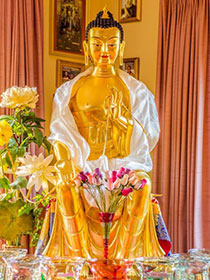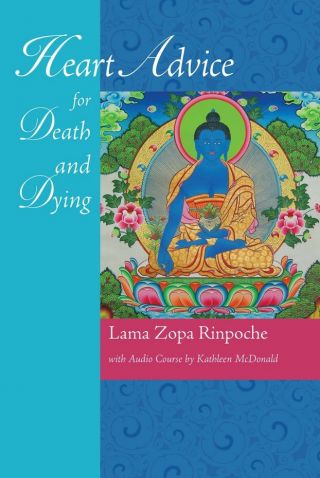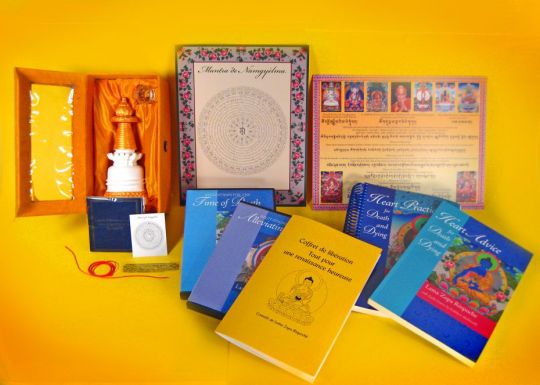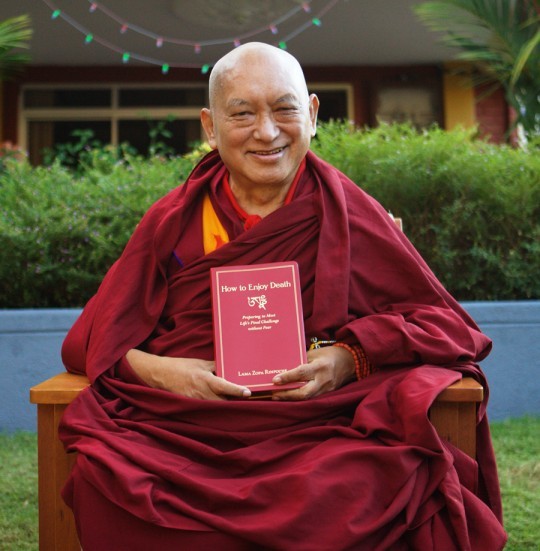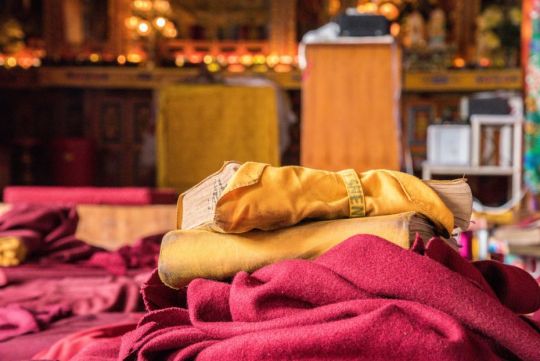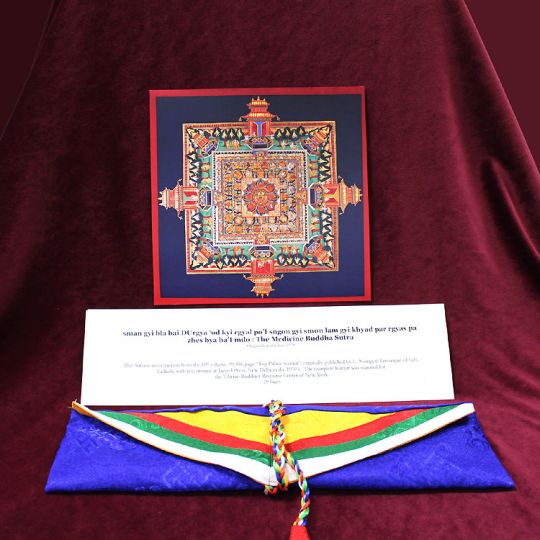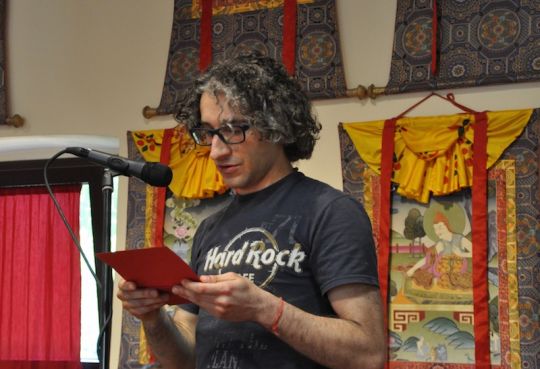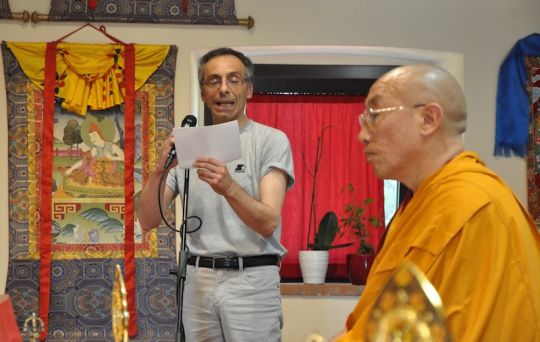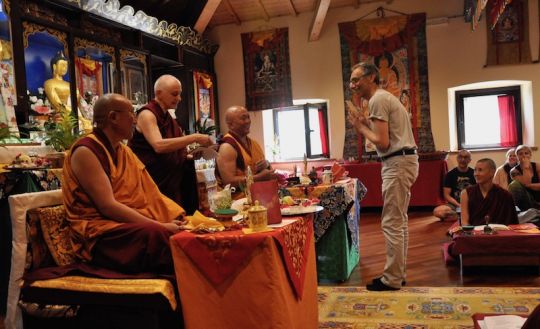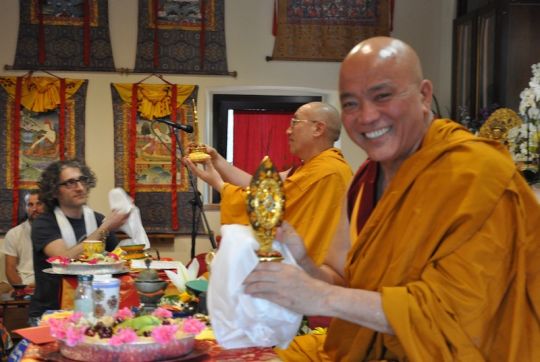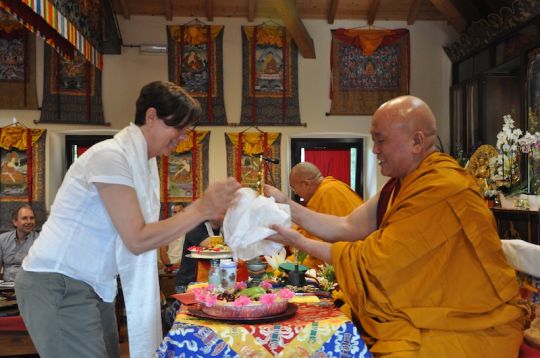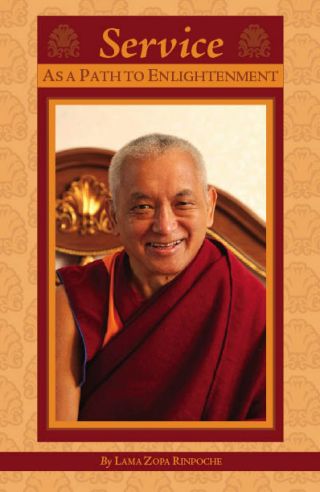- Home
- FPMT Homepage
Foundation for the Preservation of the Mahayana Tradition
The FPMT is an organization devoted to preserving and spreading Mahayana Buddhism worldwide by creating opportunities to listen, reflect, meditate, practice and actualize the unmistaken teachings of the Buddha and based on that experience spreading the Dharma to sentient beings. We provide integrated education through which people’s minds and hearts can be transformed into their highest potential for the benefit of others, inspired by an attitude of universal responsibility and service. We are committed to creating harmonious environments and helping all beings develop their full potential of infinite wisdom and compassion. Our organization is based on the Buddhist tradition of Lama Tsongkhapa of Tibet as taught to us by our founders Lama Thubten Yeshe and Lama Thubten Zopa Rinpoche.
- Willkommen
Die Stiftung zur Erhaltung der Mahayana Tradition (FPMT) ist eine Organisation, die sich weltweit für die Erhaltung und Verbreitung des Mahayana-Buddhismus einsetzt, indem sie Möglichkeiten schafft, den makellosen Lehren des Buddha zuzuhören, über sie zur reflektieren und zu meditieren und auf der Grundlage dieser Erfahrung das Dharma unter den Lebewesen zu verbreiten.
Wir bieten integrierte Schulungswege an, durch denen der Geist und das Herz der Menschen in ihr höchstes Potential verwandelt werden zum Wohl der anderen – inspiriert durch eine Haltung der universellen Verantwortung und dem Wunsch zu dienen. Wir haben uns verpflichtet, harmonische Umgebungen zu schaffen und allen Wesen zu helfen, ihr volles Potenzial unendlicher Weisheit und grenzenlosen Mitgefühls zu verwirklichen.
Unsere Organisation basiert auf der buddhistischen Tradition von Lama Tsongkhapa von Tibet, so wie sie uns von unseren Gründern Lama Thubten Yeshe und Lama Thubten Zopa Rinpoche gelehrt wird.
- Bienvenidos
La Fundación para la preservación de la tradición Mahayana (FPMT) es una organización que se dedica a preservar y difundir el budismo Mahayana en todo el mundo, creando oportunidades para escuchar, reflexionar, meditar, practicar y actualizar las enseñanzas inconfundibles de Buda y en base a esa experiencia difundir el Dharma a los seres.
Proporcionamos una educación integrada a través de la cual las mentes y los corazones de las personas se pueden transformar en su mayor potencial para el beneficio de los demás, inspirados por una actitud de responsabilidad y servicio universales. Estamos comprometidos a crear ambientes armoniosos y ayudar a todos los seres a desarrollar todo su potencial de infinita sabiduría y compasión.
Nuestra organización se basa en la tradición budista de Lama Tsongkhapa del Tíbet como nos lo enseñaron nuestros fundadores Lama Thubten Yeshe y Lama Zopa Rinpoche.
A continuación puede ver una lista de los centros y sus páginas web en su lengua preferida.
- Bienvenue
L’organisation de la FPMT a pour vocation la préservation et la diffusion du bouddhisme du mahayana dans le monde entier. Elle offre l’opportunité d’écouter, de réfléchir, de méditer, de pratiquer et de réaliser les enseignements excellents du Bouddha, pour ensuite transmettre le Dharma à tous les êtres. Nous proposons une formation intégrée grâce à laquelle le cœur et l’esprit de chacun peuvent accomplir leur potentiel le plus élevé pour le bien d’autrui, inspirés par le sens du service et une responsabilité universelle. Nous nous engageons à créer un environnement harmonieux et à aider tous les êtres à épanouir leur potentiel illimité de compassion et de sagesse. Notre organisation s’appuie sur la tradition guéloukpa de Lama Tsongkhapa du Tibet, telle qu’elle a été enseignée par nos fondateurs Lama Thoubtèn Yéshé et Lama Zopa Rinpoché.
Visitez le site de notre Editions Mahayana pour les traductions, conseils et nouvelles du Bureau international en français.
Voici une liste de centres et de leurs sites dans votre langue préférée
- Benvenuto
L’FPMT è un organizzazione il cui scopo è preservare e diffondere il Buddhismo Mahayana nel mondo, creando occasioni di ascolto, riflessione, meditazione e pratica dei perfetti insegnamenti del Buddha, al fine di attualizzare e diffondere il Dharma fra tutti gli esseri senzienti.
Offriamo un’educazione integrata, che può trasformare la mente e i cuori delle persone nel loro massimo potenziale, per il beneficio di tutti gli esseri, ispirati da un’attitudine di responsabilità universale e di servizio.
Il nostro obiettivo è quello di creare contesti armoniosi e aiutare tutti gli esseri a sviluppare in modo completo le proprie potenzialità di infinita saggezza e compassione.
La nostra organizzazione si basa sulla tradizione buddhista di Lama Tsongkhapa del Tibet, così come ci è stata insegnata dai nostri fondatori Lama Thubten Yeshe e Lama Zopa Rinpoche.
Di seguito potete trovare un elenco dei centri e dei loro siti nella lingua da voi prescelta.
- 欢迎 / 歡迎
简体中文
“护持大乘法脉基金会”( 英文简称:FPMT。全名:Foundation for the Preservation of the Mahayana Tradition) 是一个致力于护持和弘扬大乘佛法的国际佛教组织。我们提供听闻,思维,禅修,修行和实证佛陀无误教法的机会,以便让一切众生都能够享受佛法的指引和滋润。
我们全力创造和谐融洽的环境, 为人们提供解行并重的完整佛法教育,以便启发内在的环宇悲心及责任心,并开发内心所蕴藏的巨大潜能 — 无限的智慧与悲心 — 以便利益和服务一切有情。
FPMT的创办人是图腾耶喜喇嘛和喇嘛梭巴仁波切。我们所修习的是由两位上师所教导的,西藏喀巴大师的佛法传承。
繁體中文
護持大乘法脈基金會”( 英文簡稱:FPMT。全名:Found
ation for the Preservation of the Mahayana Tradition ) 是一個致力於護持和弘揚大乘佛法的國際佛教組織。我們提供聽聞, 思維,禪修,修行和實證佛陀無誤教法的機會,以便讓一切眾生都能 夠享受佛法的指引和滋潤。 我們全力創造和諧融洽的環境,
為人們提供解行並重的完整佛法教育,以便啟發內在的環宇悲心及責 任心,並開發內心所蘊藏的巨大潛能 — 無限的智慧與悲心 – – 以便利益和服務一切有情。 FPMT的創辦人是圖騰耶喜喇嘛和喇嘛梭巴仁波切。
我們所修習的是由兩位上師所教導的,西藏喀巴大師的佛法傳承。 察看道场信息:
- FPMT Homepage
- News/Media
-
- Study & Practice
-
-
- About FPMT Education Services
- Latest News
- Programs
- New to Buddhism?
- Buddhist Mind Science: Activating Your Potential
- Heart Advice for Death and Dying
- Discovering Buddhism
- Living in the Path
- Exploring Buddhism
- FPMT Basic Program
- FPMT Masters Program
- FPMT In-Depth Meditation Training
- Maitripa College
- Lotsawa Rinchen Zangpo Translator Program
- Universal Education for Compassion & Wisdom
- Online Learning Center
-
- Prayers & Practice Materials
- Overview of Prayers & Practices
- Full Catalogue of Prayers & Practice Materials
- Explore Popular Topics
- Benefiting Animals
- Chenrezig Resources
- Death & Dying Resources
- Lama Chopa (Guru Puja)
- Lama Zopa Rinpoche: Compendium of Precious Instructions
- Lama Zopa Rinpoche: Life Practice Advice
- Lama Zopa Rinpoche Practice Series
- Lamrim Resources
- Mantras
- Prayer Book Updates
- Purification Practices
- Sutras
- Thought Transformation (Lojong)
- Audio Materials
- Dharma Dates - Tibetan Calendar
- Translation Services
- Publishing Services
- Ways to Offer Support
- Prayers & Practice Materials
-
- Teachings and Advice
- Find Teachings and Advice
- Lama Zopa Rinpoche Advice Page
- Lama Zopa Rinpoche: Compendium of Precious Instructions
- Lama Zopa Rinpoche Video Teachings
- ༧སྐྱབས་རྗེ་བཟོད་པ་རིན་པོ་ཆེ་མཆོག་ནས་སྩལ་བའི་བཀའ་སློབ་བརྙན་འཕྲིན།
- Podcasts
- Lama Yeshe Wisdom Archive
- Buddhism FAQ
- Dharma for Young People
- Resources on Holy Objects
- Teachings and Advice
-
-
*If a menu item has a submenu clicking once will expand the menu clicking twice will open the page.
-
-
- Centers
-
- Teachers
-
- Projects
-
-
-
-
*If a menu item has a submenu clicking once will expand the menu clicking twice will open the page.
-
-
- FPMT
-
-
-
-
-
Countless sentient beings have suffered by being harmed or killed for every grain of rice you eat. Think about the previous grain from which it came. If you understand this, there’s no way you’ll be able to eat simply for your own selfish enjoyment; you’ll always make offerings of your food and drink.
Lama Zopa Rinpoche
-
-
-
- Shop
-
-
-
The Foundation Store is FPMT’s online shop and features a vast selection of Buddhist study and practice materials written or recommended by our lineage gurus. These items include homestudy programs, prayers and practices in PDF or eBook format, materials for children, and other resources to support practitioners.
Items displayed in the shop are made available for Dharma practice and educational purposes, and never for the purpose of profiting from their sale. Please read FPMT Foundation Store Policy Regarding Dharma Items for more information.
-
-
Study & Practice News
9
Death and Dying Materials from FPMT
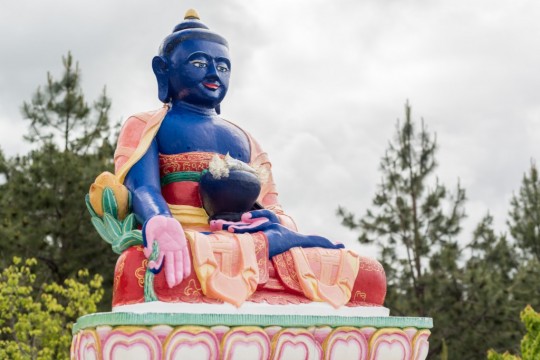
Medicine Buddha statue at Buddha Amitabha Pure Land, Washington, US, June 2015. Photo by Chris Majors.
It is difficult to accept the inevitability of our own deaths or the deaths of our loved ones. And although avoiding death is not possible, it is possible to prepare for death and equip ourselves with tools to help those around us engage with their own deaths in the most beneficial way.
Essential Advice for Students
Lama Zopa Rinpoche had repeatedly taught that Medicine Buddha practice, such as the Medicine Buddha Puja, the Wish-Fulfilling Jewel, is the main spiritual activity to engage in before, during, and after death. FPMT now makes available Medicine Buddha ritual sets to help students better practice according to Rinpoche’s advice.
Rinpoche has recommended as an additional essential practice to recite Eight Prayers to Benefit the Dead, which is usually recited by Gelug monasteries to benefit those who have recently died.
Essential Advice for Centers
All FPMT centers, projects, and services are encouraged to have a least one student who has done the Heart Advice for Death and Dying course and knows how to use the Liberation Box, a collection of tools for the time of death.
This package is a collection of Lama Zopa Rinpoche’s essential advice and commentaries for the time of death and for finding the deepest fulfillment in life. Teachings by Lama Zopa Rinpoche include, “The Nine-Point Meditation on Death,” “The Process of Dying,” “Preparing for Death,” “Practicing the Five Powers,” “Caring for the Dying and the Dead,” “Essential Activities at the Death Time,” and “Mantras to Benefit the Dying and Dead.” This collection also includes an MP3 CD of eleven hours of teachings on death by Ven. Sangye Khadro. In addition to the book and CD, this material is also available as a structured study program.
Heart Advice for Death and Dying is available as a hardcopy book, ebook, and FPMT Online Learning Center program, and as hardcopy and digital programs for hosting centers.
Liberation Box
This collection of tools for the time of death has been assembled according to Lama Zopa Rinpoche’s advice and contains powerful methods for ensuring a fortunate rebirth for those who have died or are in the process of dying. It is available as a hardcopy collection in English, French, or Spanish; or in an English-language digital edition.
Heart Practices for Death and Dying
This condensed resource book, available in hardcopy and digital formats, provides the heart practices to do at the time of death, including the Medicine Buddha puja and the traditional eight prayers done in Tibetan Buddhist monasteries. This collection also contains the most powerful mantras to say for those who are dying or who have died, teachings on their precise benefits, as well as a sheet of mantras to place on the body of one who has died. It contains precious texts to benefit the minds of those who are dying by relieving pain and purifying negative karma.
Rinpoche’s Latest Book on Death and Dying
How to Enjoy Death
A unique new collection, How to Enjoy Death: Preparing to Meet Life’s Final Challenge Without Fear, brings together all the extensive commentary from Lama Zopa Rinpoche as well as a number of essential prayers, practices, and other materials that Lama Zopa Rinpoche has compiled over the years, skillfully edited by Ven. Robina Courtin.
“We Buddhists all know about death and impermanence, but when death comes into our lives we often panic and don’t know what to do to help,” said Ven. Robina. “Rinpoche lays out all the instructions so clearly, one step at a time, for how to help our loved ones: what to do in the months and weeks before death, what to do in the hours before death, at the time the breath stops, and in the three days as well as the forty-nine days after death, including transforming our loved one’s ashes into a holy object.”
All of the practices one needs to be prepared to face death are included, making this an essential reference for Tibetan Buddhist practitioners, caregivers, hospice workers, and chaplains.
Resource Page
The FPMT Death and Dying: Heart Practices and Advice webpage is kept up to date with all of Lama Zopa Rinpoche’s latest advice and materials concerning death and dying.
Through comprehensive study programs, practice materials, and training seminars, FPMT Education nourishes the development of compassion, wisdom, kindness, and true happiness in individuals of all ages.
2
Showing Respect to Holy Objects
Holy objects and Dharma materials represent and contain the teachings of the Buddha and thus protect against lower rebirth and reveal the path to enlightenment. Therefore, they should be treated with respect. Below is advice taken from Lama Zopa Rinpoche’s teachings about how to treat holy objects and Dharma materials in various contexts.
Showing Respect to Dharma Images and Texts
Dharma images, which include images of holy beings, deities, and other holy objects—such as temples, stupas, and prayer wheels, which all represent the Three Rare Sublime Ones—and Dharma texts, which contain the teachings of the Buddha, and include phones, tablets, laptops, and hard drives containing Dharma, should not be stepped over or put in places where students’ feet or buttocks will point at them. They should not be put on the floor or on a bed without a cloth underneath. They should be covered or protected for transporting and kept in a high, clean place separate from more mundane materials. Other objects, including statues, stupas, ritual implements, malas, reading glasses, and so forth, should not be placed on top of Dharma books and devices containing Dharma materials. Avoid licking the fingers to turn the pages of Dharma texts.

Morgan Finnell’s “smile” slogan tattoo, Vermont, United States, July 2018. Photo courtesy of Carina Rumrill.
Tattoos
It is best not to get tattoos of holy beings, deities, holy objects, mantras, sacred syllables, or Dharma words or quotations in Tibetan or any other language because it is easy to lay on top of them, take them into the restroom, and get them dirty.
Instead, if a student wants to get an inspiring tattoo, then it is better to get a tattoo of a meaningful slogan or saying that people can read and understand, as this will have more impact and the tattooed student won’t create the negative karma of being disrespectful to the Dharma. These slogans and sayings should not be Dharma quotes or teachings taken from sutras, tantras, or commentaries.
If a student already has a Dharma-related tattoo, the student should not cover up the tattoo with another tattoo, which is considered disrespectful. Students should simply do their best to treat the tattoo with respect.
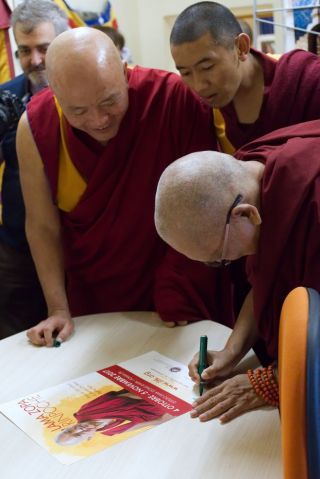
Lama Zopa Rinpoche signing a poster for Geshe Tenzin Tenphel, Istituto Lama Tzong Khapa, Pomaia, Italy, October 2017. Photo by Ven. Lobsang Sherab.
T-Shirts, Bags, Mugs, and Other Souvenirs
It is best to avoid printing holy beings, deities, holy objects, mantras, sacred syllables, or Dharma words or quotations in Tibetan or any other languages on t-shirts because students lie down on them, wear them into the restroom, wash them with dirty underwear, and do not regard these as representations of the Buddha or Dharma. It is also best to avoid having bags with similar designs on them as students often put them on the floor. Similarly, it is best to avoid having mugs with similar designs as people put them in their mouths and store them with mundane objects.
If a student treats a t-shirt with respect and doesn’t lie down on it or wash it with other clothes, Lama Zopa Rinpoche says it is OK to have a holy image or word, such “Buddha,” on a t-shirt.
Students can print slogans on t-shirts and souvenirs that make people think about Dharma but should avoid using Dharma images and words. Instead, students could consider having images of non-religious objects, for example, a smiley face.
In general, logos are OK. However, if the center logo contains a vajra, for example, that is considered a tantric implement and a holy object. The eight auspicious signs should also be treated with respect as Dharma and should not be embroidered on cushions to sit on, for example, or painted on the ground for when a lama arrives at a center.
The names, signatures, and hand writing of Lama Yeshe and other gurus are considered Dharma and should be treated with respect.
Distributing Holy Objects
Holy objects, such as prayer wheels, Dharma books, statues, images of gurus and deities, mantra rolls to go inside prayer wheels, double dorje brocade for thrones, stupas, and dorje and bell sets, should never be produced and distributed with a mind believing they are being “sold.” However, it is OK for one to collect money to cover the costs of materials and the time spent creating and distributing these holy objects.
Promotional Materials
It is OK to have holy images on posters and brochures as their purpose is to attract people to Dharma teachings. Moreover, these materials are usually placed up high and are not posted in the restroom or placed on the floor. When using Dharma images in promotional materials, it is best to not crop the image in such a way that the head or body of the holy being or deity is cut off.
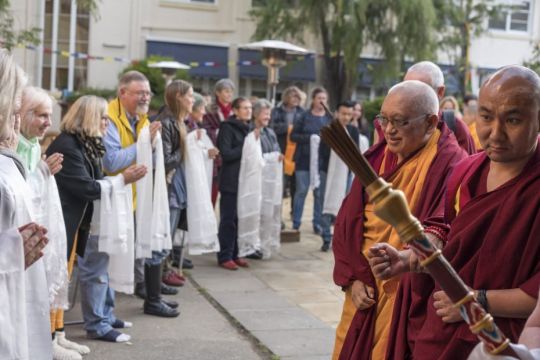
Lama Zopa Rinpoche arriving to teach, Hobart, Tasmania, Australia, May 2018. Photo by Ven. Lobsang Sherab.
Special Considerations for Khatas and Prayer Flags
Khatas, because they often have Dharma words, mantras, and the eight auspicious symbols woven into them, and prayer flags, should be treated with the same respect as other holy objects. It is best not to put khatas featuring Dharma words, mantras, etc. on the table in front of the teacher as this is where tea cups, clocks, and texts are placed. Using khatas without Dharma images and words on them is ideal.
Disposing of Holy Objects
Lama Zopa Rinpoche quotes Lama Tsongkhapa as saying that disposing of holy objects can easily become “giving up the Dharma” and disrespectful if one isn’t very careful with one’s thinking.
If it is necessary to dispose of printed Dharma materials, they should be burned rather than thrown in the trash or recycled. When burning Dharma texts, visualize that the letters transform into an A and the A absorbs into one’s heart. Imagine burning blank paper. As the paper burns, recite OṂ ĀḤ HŪṂ or the Heart Sutra, while meditating on emptiness.
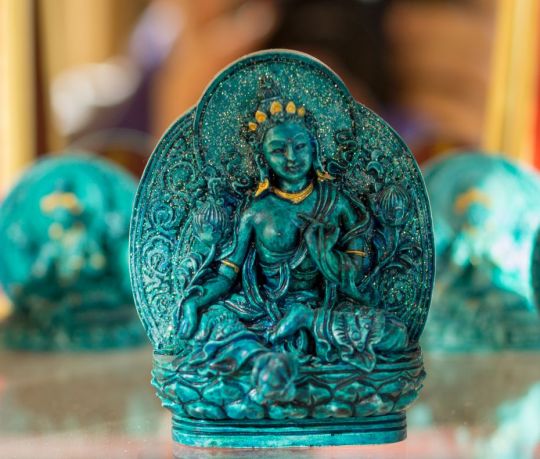
Green Tara tsa-tsa, Nalanda Monastery, Rouzegas, Labastide-Saint-Georges, France, March 2018. Photo by Harald Weichhart.
Lama Zopa Rinpoche recommends that images of holy beings, deities, and holy objects, even on khatas and prayer flags, not be burned. Ideally, if undamaged, they should be put in a stupa. If damaged, they should never go into stupas as doing so affects the minds of people who circumambulate them. Instead, put them high up in a tree inside a well-sealed structure, something like a bird house, so that the images are protected from the weather and do not end up on the ground.
Undamaged CDs, video cassettes, DVDs, etc. containing Dharma images and texts can placed in stupas. Do not put damaged or broken holy objects, such as tsa-tsas, inside stupas or statues. Instead, repair the holy objects, or, put unrepairable holy objects into tsa-tsa houses. Ensure that the objects are stored in such a way that they do not get dirty.
Through comprehensive study programs, practice materials, and training seminars, FPMT Education nourishes the development of compassion, wisdom, kindness, and true happiness in individuals of all ages.
- Tagged: holy object, holy objects, khata, prayer flags, tattoos
26
Ritual Set to Support Your Medicine Buddha Pujas
The Medicine Buddha Ritual Set for Pujas allows students to better fulfill Lama Zopa Rinpoche’s advice regarding how to perform Medicine Buddha pujas, taught as being powerful rituals for success and to benefit the dying, sick, and dead.
The set, which is also available in a modified digital format, includes one printed copy of the Medicine Buddha Sutra in Tibetan from the Buddhist Digital Resource Center, pecha style; one printed copy of the Medicine Buddha mandala, a visual representation of Medicine Buddha’s purified environment; and a wrapping cloth representing the Five Dhyani Buddhas, designed by Kopan Monastery. (To encourage practice of the puja, the Medicine Buddha puja text itself—Medicine Buddha: The Wish-Fulfilling Jewel—is an optional add-on.)
The Medicine Buddha Sutra, or Sutra of the Extensive Qualities of the Previous Vaidurya Light Prayers of the Bhagavan Medicine Guru, recounts the twelve aspirational prayers made by Medicine Buddha in his past lives that came to fruition through the force of his enlightenment. The sutra also recounts the great benefits of Medicine Buddha practice, such as those of reciting and hearing his name.
“The Medicine Buddha encompasses all the buddhas,” Lama Zopa Rinpoche teaches in “Benefits of Medicine Buddha Mantra and Practice,” available on FPMT.org. “This means that when we practice the seven-limb prayer and make offerings with the seven limbs, we receive the same merit as we would if we had made offerings to all the buddhas. Similarly, when we recite the mantra of Medicine Buddha, we collect unbelievable merit just as when we offer the seven-limb practice to Medicine Buddha.”
Find news and advice related to Medicine Buddha on FPMT.org:
https://fpmt.org/tag/medicine-buddha/
Find other Dharma items to support your Medicine Buddha practice through the Foundation Store:
https://shop.fpmt.org/search.asp?keyword=Medicine+Buddha&search=
Through comprehensive study programs, practice materials, and training seminars, FPMT Education nourishes the development of compassion, wisdom, kindness, and true happiness in individuals of all ages.
19
New Advice on Lunar and Solar Eclipses
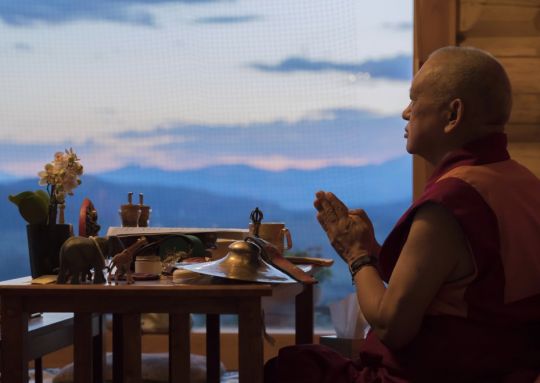
Lama Zopa Rinpoche, Buddha Amitabha Pure Land, Washington, US, June 2018. Photo by Ven. Lobsang Sherab.
Lama Zopa Rinpoche recently offered some new advice about lunar and solar eclipses, which are considered auspicious days for practice and provide opportunities for accumulating increased merit.
In addition to Lama Zopa Rinpoche reminding students that the merit generated on lunar eclipses is multiplied by 700,000 and by 100 million on solar eclipses, Rinpoche taught that the multiplying effect of eclipses occurs whether the eclipse is partial or full. Also, Rinpoche advised that the merit multiplying effect does not last the whole calendar day and that merit making activities should be carried out during the time of the eclipse itself.
Whether or not an eclipse is occurring and its exact timing depends on where a student is on Earth. Websites like timeanddate.com can help students determine if and when there is an opportunity to practice during an eclipse.
Upcoming potential lunar eclipses: July 27, August 26
Upcoming potential solar eclipses: August 11
On these multiplying days, any beneficial practices can be done. In particular, Rinpoche recommends:
- Recitation of the names of the Thirty-Five Confession Buddhas
- Recitation of Vajrasattva mantras
Any other meritorious activities advised by Lama Zopa Rinpoche are also good to do on these days, such as recitation of the Vajra Cutter Sutra, the Sutra of Golden Light, and the Sanghata Sutra, with extensive dedications. These texts are available on the “Sutras” page on FPMT.org.
July 27 is possibly a lunar eclipse in your part of the world! All are encouraged to use a website like timeanddate.com to determine if and when one might participate in generating 700,000 times the merit than what would be accumulated on a non-multiplying day.
You can read more about practices specifically recommended by Rinpoche for lunar and solar eclipses, and other merit multiplying days:
https://fpmt.org/teachers/zopa/advice/practice-on-the-four-great-holy-days/
Check “Dharma Practice Dates” for information on auspicious days for practice:
https://fpmt.org/media/resources/dharma-dates/
Acquire your own copy of the Liberation Prison Project calendar through the Foundation Store:
https://shop.fpmt.org/2018-Liberation-Tibetan-Calendar-HARDCOPY_p_3017.html
Through comprehensive study programs, practice materials, and training seminars, FPMT Education nourishes the development of compassion, wisdom, kindness, and true happiness in individuals of all ages.
- Tagged: eclipse
12
Bring Dharma to the World through the FPMT Translation Fund
“The Buddha taught in Pali and Sanskrit. Later, the pandits, those great holy beings, translated them into the Tibetan language. Tibetan holds the meaning. … It is a perfect translation and gives great understanding. Those great translators were holy beings; they were bodhisattvas.” — Lama Zopa Rinpoche, 2014, Kopan Monastery, Nepal
As the Dharma takes root in the West, the FPMT organization needs to follow in the footsteps of these bodhisattvas and provide clear and accurate translations of the classic Tibetan texts in modern world languages. The FPMT Translation Fund supports this work. Translations have already been completed in English, French, Spanish, German, Italian, Portuguese, Chinese, and Mongolian.
FPMT Translation Fund sponsorships have helped translate Dharma texts and commentaries that have been crucial for successful study in FPMT in-depth education programs and for students and centers to be able to follow practice advice from Lama Zopa Rinpoche. These translations include prestigious works such as Lama Tsongkhapa’s Middle Length Lamrim into English and German and his Lamrim Chenmo into Chinese; Gyaltsab Je’s Ornament of the Essence, with Maitreya’s root verses and the Indian commentary by Haribhadra, into English; and sutras such as the Sanghata Sutra and the Sutra of Golden Light into many modern languages.
Benefactors and supporters are always needed for new projects. Several commentaries critical to the development of FPMT’s Masters Program and Basic Program—now offered in several languages—are in progress of being commissioned; and the translation of the 29-chapter edition of the Sutra of Golden Light into English is also in the advanced stages of planning.
If you would like to help make the Dharma accessible to practitioners and students around the world, we welcome and appreciate donations of any amount. Thank you so much for your support!
Through comprehensive study programs, practice materials, and training seminars, FPMT Education nourishes the development of compassion, wisdom, kindness, and true happiness in individuals of all ages.
- Tagged: fpmt translation fund
5
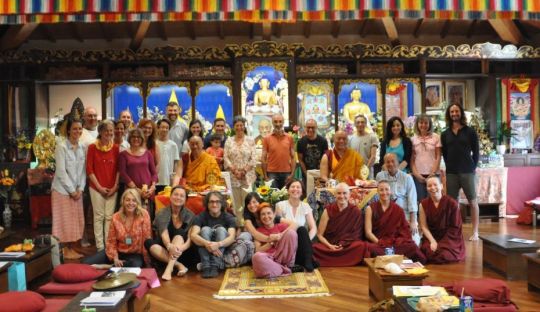
Istituto Lama Tzong Khapa’s Basic Program teachers, staff, graduates, and near graduates offered a thanksgiving puja, Pomaia, Italy, June 2018
On June 10, 2018, several students from Istituto Lama Tzong Khapa’s 2015-2018 Basic Program met to offer a thanksgiving puja to mark the conclusion of their program. From among the thirty-five students who participated in the three-month review and passed the final exam, thirteen have already graduated, while another twenty have plans in place to fulfill their completion requirement of a month-long lamrim retreat this year. The vast majority of students participated in the program online, an impressive achievement considering how difficult it can be for students to complete multi-year online programs!
The ceremony was an opportunity to present offerings and give thanks to Geshe Tenphel and Geshe Gelek, the teachers of Istituto Lama Tzong Khapa’s third Basic Program; to institute staff; and to all those who maintain the excellent quality of the FPMT in-depth education programs.
“Dear Geshe-las, we thank you for your immense generosity and loving kindness that you have shown us in these years with your advice and teachings,” shared all the students collectively. “Thank you for sending us the pure word of the Buddha. And thank you for your patience, availability, smiles, and laughter. May all your holy wishes be fulfilled immediately and may your lives be long and stable!”
“Dear friends, sisters, and brothers of Dharma, it is with immense joy that I want to thank you for the journey that has brought us together so far,” said student Carlo Lo Conte during his expression of gratitude. “A journey that has taught us how the reality conceived from our minds’ sides is illusory, about how it actually works; that has taught us how much our afflictions distort the vision of existence by projecting us into misery and suffering; that has taught us how the causes of suffering can be transformed into causes of happiness if we could only get out of the narrow cage in which we are locked up and project ourselves into a broader mental state where we can meet other beings, their sufferings, and their expectations of happiness ….”
“Dear Geshe-la, one of my first memories of the Basic Program is your reassurance: ‘Do not worry. Listen to me. Eventually, you will understand these texts,’” recalled residential student Ven. Dechen. “At that time, for some of us, nothing seemed further from the truth … You took care of everyone and filled the room with warmth and love … You are the perfect teacher of Bodhicharyavatara; you brought this teaching of Shantideva to life, offering the perfect medicine for ourselves and for others. When we were seized by our confusion and thought we did not understand anything, you continued, patiently planting the seeds for our future understanding. Sometimes when you raised the mirror of Dharma and you showed us our minds, it was not nice, but you were able to accompany us with love and compassion, firmly leading us forward. We are all better people thanks to you.”
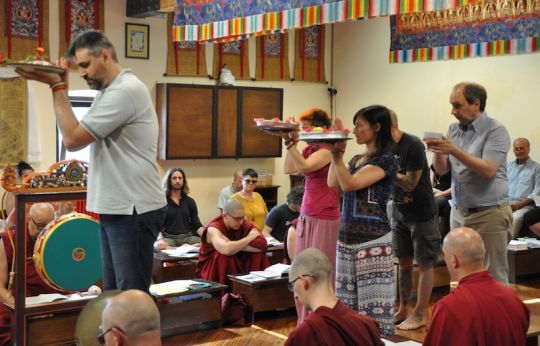
Students Andrea Fuser, Elena Vangi, Silvia Persico, Nicola Dagnino, and Luca Morelli offer tsog, Pomaia, Italy, June 2018
“Dear Geshe-la, I’m so sorry I can not be at the closing puja of the Basic Program!” wrote residential student Paul Sala in an email. “It was such a great pleasure for me to listen to your teachings. … You often manifested an ‘extremely radiant facial appearance’ and I was so happy to respond to your smile. Naturally, it was not just the smile. I have often noticed how much attention and care you had for us students, addressing our concerns to be able to grasp its essence, and making sure we could really transform our minds.”
On behalf of the Istituto Lama Tzong Khapa education coordinator, the Istituto itself, and FPMT Education Services, thanks were offered as well to all the students, who have worked so hard in recent years. To quote Lama Zopa Rinpoche: “Studying Dharma means less ignorance, more wisdom. It means more light in your life, in your mind, no darkness. It means that you have more freedom in your life to achieve liberation from samsara, great enlightenment. The more you understand Dharma, the more you can benefit others, give more light to others, get them to have a deeper and clearer understanding of Dharma.”
Registration is open for the fourth round of the residential and online Basic Program at Istituto Lama Tzong Khapa, taking place September 2018 through June 2022. Completing individual subjects is also possible. For more information and to register, please visit Istituto Lama Tzong Khapa’s Basic Program 2018-2022.
Through comprehensive study programs, practice materials, and training seminars, FPMT Education nourishes the development of compassion, wisdom, kindness, and true happiness in individuals of all ages.
- Tagged: basic program, istituto lama tzong khapa
28
On July 6 the world will celebrate His Holiness the Dalai Lama’s 83rd birthday. Enjoy these many resources available to help celebrate, praise, and learn from His Holiness!
Long Life Prayers
- Prayers for His Holiness the Dalai Lama and Tibet includes all the prayers for His Holiness and Tibet that are found within Essential Buddhist Prayers, such as “Prayers for the Long Life of His Holiness the Dalai Lama,” the “Prayer that Spontaneously Fulfills all Wishes,” “Remembering the Kindness of His Holiness the Dalai Lama and the Tibetan People,” a “Prayer for Tibet”, and “Song of Immortality” composed by the late tutors to His Holiness the Dalai Lama, His Holiness Ling Rinpoche and His Holiness Trijang Rinpoche. Translated by Translated by Geshe Thupten Jinpa, 2002.
-
“Remembering the Kindness of His Holiness the Dalai Lama and the Tibetan People” was composed by Lama Zopa Rinpoche especially for the success of His Holiness’s wishes, and in particular for the Tibetan people, and for there to be perfect peace and happiness in the world and for all sentient beings to achieve enlightenment.
Praises and Requests
- “Praises and Requests to His Holiness the Dalai Lama” is a collection of praises, comments, and requests by Lama Zopa Rinpoche concerning His Holiness available in the Lama Yeshe Wisdom Archive Online Advice Book.
Writings
- The Foundation Store offers a number of books by His Holiness, including his most recent book co-authored with Ven. Thubten Chodron, The Foundation of Buddhist Practice, published by Wisdom Publications.
- When His Holiness was nineteen years old, he composed a Chenrezig guru yoga sadhana titled The Inseparability of the Spiritual Master and Avalokiteshvara. The practice includes visualizations that inspire the development of compassion and wisdom and is included in Becoming the Compassion Buddha by Lama Yeshe.
FPMT Education Services wishes His Holiness a very auspicious 83rd birthday and sincerely requests His Holiness to live for a very long time to continue bringing his universal message of compassion to the world.
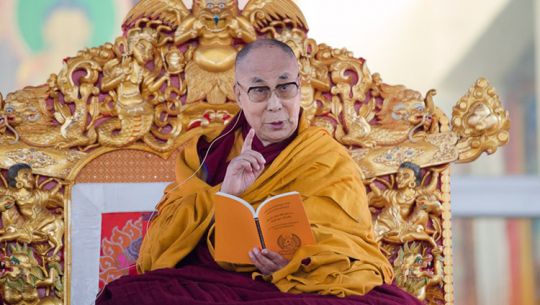
His Holiness the Dalai Lama explaining a text on the first day of his teachings at the Kalachakra Maidan in Bodhgaya, Bihar, India on January 5, 2018. Photo by Lobsang Tsering, courtesy DalaiLama.com.
Through comprehensive study programs, practice materials, training seminars, and scholarships, FPMT Education nourishes the development of compassion, wisdom, kindness, and true happiness in individuals of all ages.
- Tagged: his holiness the dalai lama
14
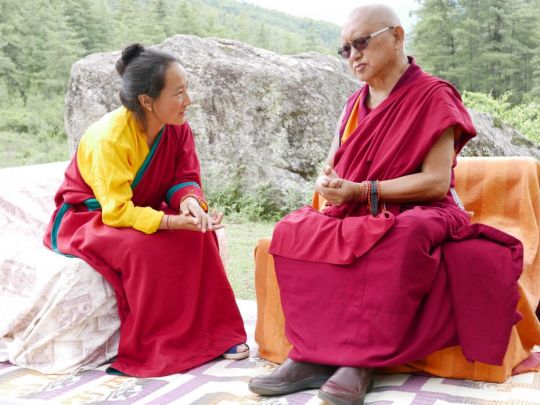
Lama Zopa Rinpoche and Khadro-la (Rangjung Neljorma Khadro Namsel Drönme) at a picnic at the base camp of trail to Thaktsang Monastery, Bhutan, May 2016. Photo by Ven. Roger Kunsang.
In 2016, Khadro-la (Rangjung Neljorma Khadro Namsel Drönme) spontaneously composed a prayer for Lama Zopa Rinpoche, which was offered during a long life puja for Rinpoche held March 13, 2016, at Amitabha Buddhist Centre in Singapore. The English translation of the prayer was read for all to hear while Rinpoche received the prayer in Tibetan. Students can find the prayer translated from Tibetan into Chinese, English, German, Italian, and Spanish.
Also, students can find tunes for the Tibetan-language version, created by Bhutanese musicians Pema Samdrup and Pema Lhamo. Lama Zopa Rinpoche asked that these recordings be played at big retreats during break times or while students are waiting in the gompa. He also asked that both or either of these tunes be learned and used when offering the prayer.
Recently, audio and video recordings of Vens. Dechen and Gyalten were made during the Bodhicaryavatara and Rinjung Gyatsa Retreat at the Great Stupa of Universal Compassion in Benidgo, Australia, to help facilitate students learning the tune. We invite all students of Rinpoche to learn the tune as quickly as possible.
Watch “Long Life Prayer for Lama Zopa Rinpoche” on YouTube:
https://www.youtube.com/watch?v=Uv4s40hBmRU
Through comprehensive study programs, practice materials, training seminars, and scholarships, FPMT Education nourishes the development of compassion, wisdom, kindness, and true happiness in individuals of all ages.
- Tagged: khandro kunga bhuma, lama zopa rinpoche long life prayer, long life prayer, long life prayers
7
‘Bringing Emptiness to Life,’ A Living in the Path Module
In the Living in the Path module “Bringing Emptiness to Life,” Lama Zopa Rinpoche gives detailed and very clear teachings on the extremely important subject of emptiness, the realization of which is necessary to achieve both liberation from samsara and full enlightenment.
“During this time, [when you are meditating on or practicing mindfulness of the reality of everything, I, actions, objects, the whole thing], you are working for your liberation,” Lama Zopa Rinpoche teaches. “Here, you are really working for your liberation because the superstitious thoughts—ignorance, anger, and attachment—do not arise. While your mind is in this state, it is the antidote against ignorance and all the delusions, so you are working to achieve liberation, ultimate happiness. It never happened before. Not only has it never happened in this life, it never happened from beginningless rebirths.”
In this introductory video to the module, Don Handrick gives a clear and comprehensive presentation of the subject of emptiness, which according to the Madhyamaka Prasangika, the highest school of Buddhist philosophy, refers to the lack of true existence of the self and all phenomena.
Watch “Bringing Emptiness to Life—An Introduction” on YouTube:
https://youtu.be/9WCq8EUMrho
Don Handrick is a graduate of the first FPMT Masters Program 1998-2004. Since 2006, he has been the resident teacher at Thubten Norbu Ling Buddhist Center in Santa Fe, New Mexico. He also teaches regularly at the Ksitigarbha Tibetan Buddhist Center in Taos, and also serves as a Buddhist teacher in a local prison for Liberation Prison Project. In 2015, he led the month-long November course at Kopan Monastery and, in 2016, he began spending a part of each year visiting other FPMT centers as a touring teacher. Don is an FPMT registered teacher.
Living in the Path is an online lamrim course taught by Lama Zopa Rinpoche available through the FPMT Online Learning Center:
https://onlinelearning.fpmt.org/course/index.php?categoryid=5
Through comprehensive study programs, practice materials, training seminars, and scholarships, FPMT Education nourishes the development of compassion, wisdom, kindness, and true happiness in individuals of all ages.
- Tagged: don handrick, emptiness, living in the path
31
Sutra of Golden Light Resources
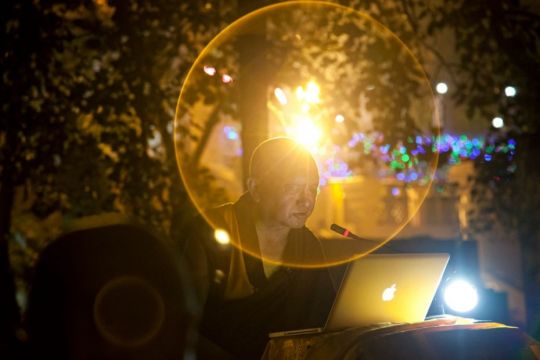
Lama Zopa Rinpoche giving an oral transmission of the Sutra of Golden Light, Bodhgaya, India, March 2014. Photo by Andy Melnic.
Students can find a variety of helpful resources for the Sutra of Golden Light (also known as the Golden Light Sutra) on FPMT.org. Lama Zopa Rinpoche teaches that “the most beneficial thing to have peace and to stop wars is recitation of the Golden Light Sutra. … It is extremely powerful and fulfills all one’s wishes, as well as brings peace and happiness for all sentient beings, up to enlightenment. It is also extremely powerful for one’s own protection and for the protection of the country and the world.”
Rinpoche has made a personal vow to propagate this text and give oral transmissions of it in many parts of the world. One of Rinpoche’s vast visions for FPMT is to have the sutra recited as much as possible, particularly in countries experiencing war or disaster.
Here is what you can find on FPMT.org’s Sutra of Golden Light resource page:
Rinpoche’s Request to FPMT Centers and Students
In 2007, Lama Zopa Rinpoche made a explicit request for FPMT centers and students to recite the Sutra of Golden Light as much as possible for world peace. “For anyone who desires peace for themselves and for others, this is the spiritual, or Dharma, way to bring peace that doesn’t require you to harm others, doesn’t require you to criticize others or even to demonstrate against others, yet can accomplish peace. Anyone can read this text, Buddhists and even non-Buddhists who desire world peace. …” Find the full request on FPMT.org.
Oral Transmission
Students can receive the oral transmission of the Sutra of Golden Light online from Lama Zopa Rinpoche. On various occasions, Lama Zopa Rinpoche has taught that receiving the oral transmission (lung) of prayers, practices, and texts is very beneficial. In addition to multiplying the benefits of one’s own recitations of the text by one hundred, the oral transmission creates positive imprints on one’s mind that lead to enlightenment. To receive the oral transmission, students need merely watch the video or listen to the audio file on FPMT.org in its entirety.
Download the Sutra of Golden Light for Recitation and Wearing
The Sutra of the Golden Light exists in 21-chapter, 29-chapter, and 31-chapter editions. On FPMT.org, students can download the 21-chapter edition in 12 languages; the 29-chapter edition in Mongolian; and the 31-chapter edition in Vietnamese. The 21-chapter Tibetan edition is also available as a small-size text to be worn on the body for protection or to be utilized in portable altars.
Sutra of Golden Light, 29 Chapter Translation Project
While the translation of the 31-chapter edition of the Sutra of Golden Light is already underway, the translation of the 29-chapter edition of the Sutra of Golden Light from Tibetan into English has yet to begin. Students are welcome to make a financial donation in order to support this FPMT translation project requested by Lama Zopa Rinpoche. Students’ prayers and dedications for the project’s quick and successful completion are also humbly requested.
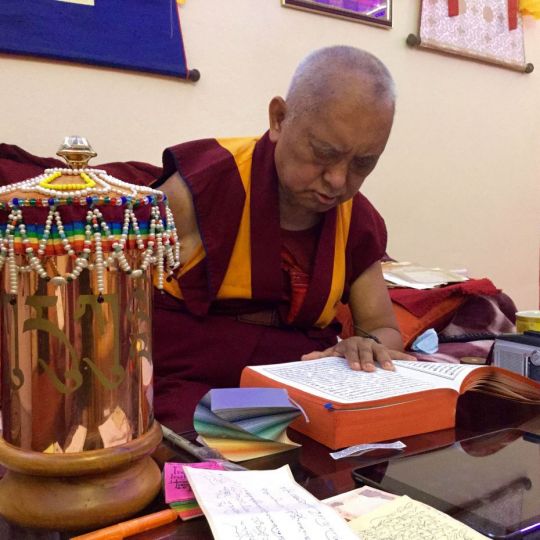
Lama Zopa Rinpoche reciting the Sutra of Golden Light for Anila Ann, a long-time student who was dying, Bodhgaya, India, February 2015. Photo by Ven. Sarah Thresher.
Reporting Recitations and Recitation Count
Students are invited to report their completed recitations to be included in our continually updated recitation count. As of December 2017, FPMT students have reported 43,843 recitations taking place in 82 countries.
Student Experiences and Questions
Student are also invited to share their experiences hearing, reading, reciting, or just thinking about the Sutra of Golden Light, which are shared with other students around the world. One student reported, for example, after reciting the sutra that “a palpable sense of peace descended on my wife’s and my home. The dog of a friend got lost in the desert and did not return home, but eight days later was found. Our daughter-in-law announced that she had conceived some weeks before after having been told by her doctors that she would never conceive again.”
All the editions of the Sutra of Golden Light are complex and rich with detail. Students can post their own questions about the text and read responses to frequently asked questions online.
How to Dedicate
In 2007, Lama Zopa Rinpoche gave advice about how students should dedicate their recitations of the Sutra of Golden Light. Find a summary of how to dedicate the merits of reciting the sutra on FPMT.org.
Print copies of the 21-chapter edition of the Sutra of Golden Light are available through the Foundation Store:
https://shop.fpmt.org/The-King-of-Glorious-Sutras-called-the-Exalted-Sublime-Golden-Light_p_621.html
Through comprehensive study programs, practice materials, training seminars, and scholarships, FPMT Education nourishes the development of compassion, wisdom, kindness, and true happiness in individuals of all ages.
- Tagged: golden light sutra, sutra of golden light
24
Ebook! Service as a Path to Enlightenment
Service as a Path to Enlightenment, available in ebook formats through the Foundation Store, is a compilation of two letters—“Cultivating a Skillful Attitude” and “Leading with the Mind of a Servant”—dictated by Lama Zopa Rinpoche for FPMT staff members concerning how to make working for an FPMT center, project, or service the best kind of service. Any student can benefit from reading this text.
“At the Dharma center, we should generate this motivation in the morning after we wake up, wherever we are—in our bed or on a chair,” Lama Zopa Rinpoche writes. “From that time until we die, but especially on that day, we should think: ‘This is how I’m going to think about everybody at the center—the staff and the visitors: “Everyone is most precious, dear and kind.” I’m going to practice this.’ This is what makes our life most happy and joyful. Wow!
“Our heart and all our actions change and we respect everybody. We have good manners and sweet words, and every single action of our body, speech, and mind is respectful. We want to help others, naturally, with deep interest. We don’t get bothered and we are unbelievably happy to help.
“Working at the center is for all sentient beings and especially to spread Dharma—the most important thing that others need to free them from suffering and bring them to enlightenment. That’s our motivation for working at the center with all the staff and visitors. If we keep our mind on this, it’s fantastic and we’re doing the best Dharma practice.
“It’s exactly the same if we are at home with our family or working for a company or the government. Practicing that way, there’s no personality clash. There’s no empty space between that person and us, and everybody is in our heart. Everyone is close to us and we’re very close to everyone. That makes others happy and it makes us happy, so we have the most wonderful life, the best life.”
Service as a Path to Enlightenment is available through the Foundation Store:
https://shop.fpmt.org/Service-as-a-Path-to-Enlightenment-eBook-PDF_p_2792.html
Through comprehensive study programs, practice materials, training seminars, and scholarships, FPMT Education nourishes the development of compassion, wisdom, kindness, and true happiness in individuals of all ages.
17
Mantra Resource Page on FPMT.org
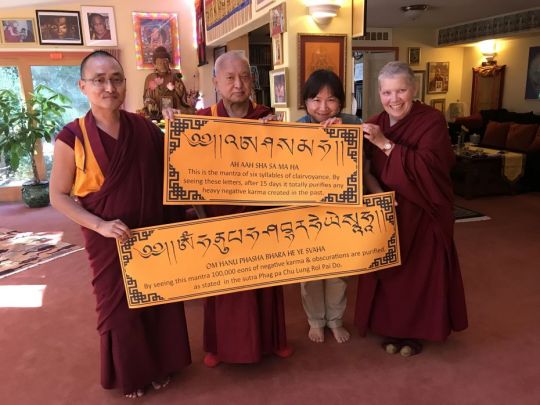
Lama Zopa Rinpoche with Ven. Lobsang Sherab, Monica Hung, and Ven. Carol Corradi with mantra posters, Aptos, California, US, June 2017. Photo by Ven. Roger Kunsang.
FPMT Education Services’ mantra resource page on FPMT.org offers students many commonly used mantras for their personal use. Recently added are the Just by Seeing Mantras—the Phagpa Chulung Rolpai Do Mantra and the Six Syllables of Clairvoyance Mantra, which are only necessary to be seen by sentient beings to have benefit.
Mantras, meaning “mind protection,” are Sanskrit syllables, usually recited in conjunction with the practice of a particular meditational deity, and embody the qualities of the deity with which they are associated. Some mantras are so powerful that they are said to be able to benefit others even when no virtuous motivation is present.
Extensive advice from Lama Zopa Rinpoche about the benefits of reading, writing, or reciting particular mantras, or how to engage with mantras to eliminate or reduce potential or ongoing obstacles, is available on FPMT.org’s Advice from Lama Zopa Rinpoche and Lama Yeshe Wisdom Archive’s Lama Zopa Rinpoche’s Online Advice Book pages.
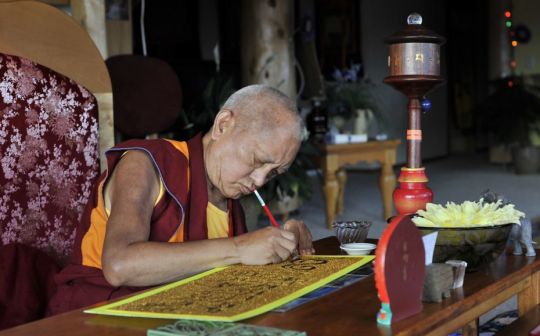
Lama Zopa Rinpoche writing out a mantra, Buddha Amitabha Pura Land, Washington, US, September 2016. Photo by Ven. Losang Sherab.
The Phagpa Chulung Rolpai Do Mantra card, the Six Syllables of Clairvoyance Mantra card, and other mantra cards are available through the Foundation Store:
https://shop.fpmt.org
Through comprehensive study programs, practice materials, training seminars, and scholarships, FPMT Education nourishes the development of compassion, wisdom, kindness, and true happiness in individuals of all ages.
- Tagged: just by seeing mantras, mantra, mantras
- Home
- News/Media
- Study & Practice
- About FPMT Education Services
- Latest News
- Programs
- New to Buddhism?
- Buddhist Mind Science: Activating Your Potential
- Heart Advice for Death and Dying
- Discovering Buddhism
- Living in the Path
- Exploring Buddhism
- FPMT Basic Program
- FPMT Masters Program
- FPMT In-Depth Meditation Training
- Maitripa College
- Lotsawa Rinchen Zangpo Translator Program
- Universal Education for Compassion & Wisdom
- Online Learning Center
- Prayers & Practice Materials
- Overview of Prayers & Practices
- Full Catalogue of Prayers & Practice Materials
- Explore Popular Topics
- Benefiting Animals
- Chenrezig Resources
- Death & Dying Resources
- Lama Chopa (Guru Puja)
- Lama Zopa Rinpoche: Compendium of Precious Instructions
- Lama Zopa Rinpoche: Life Practice Advice
- Lama Zopa Rinpoche Practice Series
- Lamrim Resources
- Mantras
- Prayer Book Updates
- Purification Practices
- Sutras
- Thought Transformation (Lojong)
- Audio Materials
- Dharma Dates – Tibetan Calendar
- Translation Services
- Publishing Services
- Teachings and Advice
- Find Teachings and Advice
- Lama Zopa Rinpoche Advice Page
- Lama Zopa Rinpoche: Compendium of Precious Instructions
- Lama Zopa Rinpoche Video Teachings
- ༧སྐྱབས་རྗེ་བཟོད་པ་རིན་པོ་ཆེ་མཆོག་ནས་སྩལ་བའི་བཀའ་སློབ་བརྙན་འཕྲིན།
- Podcasts
- Lama Yeshe Wisdom Archive
- Buddhism FAQ
- Dharma for Young People
- Resources on Holy Objects
- Ways to Offer Support
- Centers
- Teachers
- Projects
- Charitable Projects
- Make a Donation
- Applying for Grants
- News about Projects
- Other Projects within FPMT
- Support International Office
- Projects Photo Galleries
- Give Where Most Needed
- FPMT
- Shop
Translate*
*powered by Google TranslateTranslation of pages on fpmt.org is performed by Google Translate, a third party service which FPMT has no control over. The service provides automated computer translations that are only an approximation of the websites' original content. The translations should not be considered exact and only used as a rough guide.When you recognize your problem comes from your concept or your concept is the problem, you don’t blame others.







